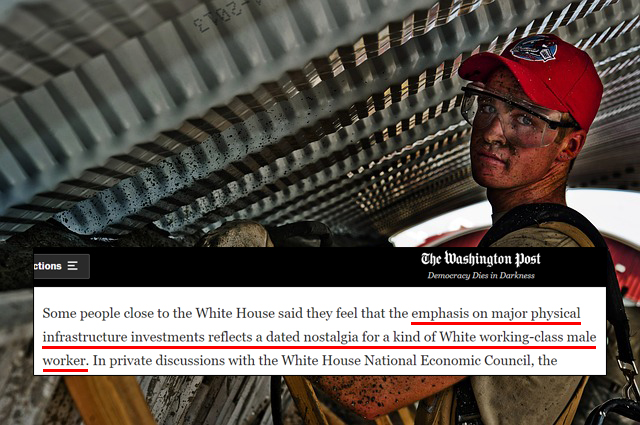WashPo: Biden Advisors Fear Infrastructure Investments May Help White Working-Class MenChris MenahanInformationLiberation Apr. 01, 2021 |
Popular 
Kentucky Rep. Thomas Massie Introduces 'Dual Loyalty Disclosure Act'

Sen. Schumer: 'My Job is to Keep the Left Pro-Israel'

Randy Fine, Who Celebrated Israel Killing An American Citizen, Struggling in Florida House Race

Trump Strong-Arms Another Law Firm Into Giving Millions in Pro-Bono Work to 'Combat Antisemitism'

Trump Pulls Stefanik Nomination for U.N. Ambassador Over Fear GOP House Majority Could Evaporate
  The Washington Post is reporting that "people close to the White House" expressed concerns that investing in "major physical infrastructure investments" may help the "White working-class male worker." The Washington Post is reporting that "people close to the White House" expressed concerns that investing in "major physical infrastructure investments" may help the "White working-class male worker."Rather than focus on building bridges, roads and physical infrastructure, Biden's advisors instead told him to focus on "major caregiving investments," such as child care and public health care -- even if they don't "normally fall into [the] definition of infrastructure" -- because caregiving investments will disproportionately help "minorities and women." From The Washington Post, "White House dramatically increased tax proposal as it sought to address tensions over next big spending plan": Democrats may use the parliamentary procedure known as reconciliation to approve an infrastructure package with a narrow majority that would not require Republican votes, the same way they approved the coronavirus relief bill. Bill Hoagland, senior vice president at the Bipartisan Policy Center, citing conversations with Senate Democratic staffers, said: "The difficulty is all the advocacy groups have seen the possibility of using reconciliation to move their agendas [for] things that do not normally fall into definition of infrastructure -- child care; public health care. The moderates and the center will say, 'Wait a minute; let's deal with those through the normal appropriations process.'"The $2 trillion infrastructure plan Biden unveiled on Wednesday spends less than 6 percent on roads and bridges. More money is spent on building "500,000 electric vehicle charging stations" and "electrify 20% of school buses and electrify the federal fleet" ($174 billion) than on modernizing bridges, highways, roads and upgrading air travel, airports, waterways and coastal ports ($157 billion). In contrast, $400 billion -- the single biggest chunk of the plan -- goes towards "caregiving" as his advisors requested. Follow InformationLiberation on Twitter, Facebook, Gab, Minds, Parler and Telegram. |



